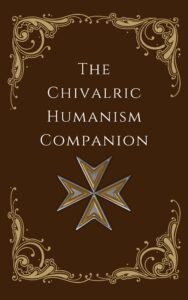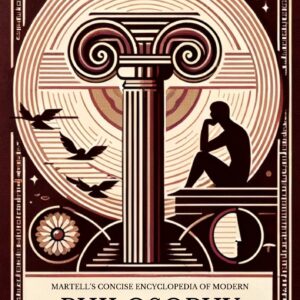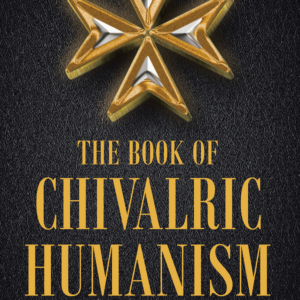About Us
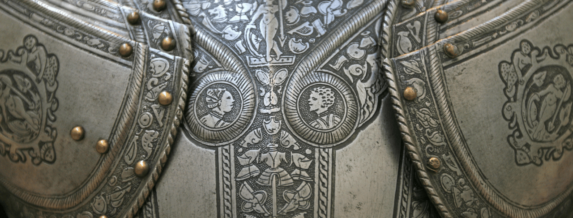
About Chivalric Humanism
Chivalric Humanism is a secular (atheist) virtue based moral framework and ethical philosophy that draws on the rich tapestry of the chivalric codes of old while infusing them with modern understandings of psychology, sociology, and philosophy. It offers a pathway to personal development, community service, and a fulfilling life guided by virtue.
It must be noted that Chivalric Humanism is not a form of Christianity, as it does not promote supernatural ide-as. Chivalric Humanism is a branch of naturalism philosophy; that is, it is rooted in the belief that only natural forces operate in the world. It does however use a variant of the cardinal virtues of Christianity, which themselves were based on the virtues of Greco-Roman philosophies. As a naturalistic philosophy, Chivalric Humanism provides logical reasons for why virtues should be cultivated in a person and how they promote the common good.

Our Vision and Identity
- Are you interested in learning how to become a better, more successful person?
- Do you want to obtain wisdom so you can make better decisions in your life?
- Do you desire the strength of will to endure and overcome hardships?
Chivalric Humanism offers a path to all of this, and more.
Chivalric Humanism is a branch of naturalism philosophy; that is, it is rooted in the belief that only natural forces operate in the world. Chivalric Humanism is characterized by its emphasis on virtue and excellence while also stressing that its adherents become champions for the rights of others in order to serve the common good. It is a form of humanism that explains the role of humans in the world and prescribes a rewarding purpose for our lives.
Modern Chivalry
Chivalric Humanism is a contemporary philosophical and ethical framework that draws inspiration from the chivalric codes and virtues of the medieval period, updated and reimagined to address the complexities of modern life. It is a philosophy centered on personal growth, social responsibility, and the pursuit of a well-rounded character through discipline, knowledge, and moral integrity.
Atheism
Chivalric Humanism falls under the category of atheism in that it does not endorse a belief in deities or other supernatural things. Atheism by itself is not a belief system, as atheism is only the absence of belief in superstitions. Chivalric Humanism is a moral framework of ethics for atheists seeking useful practical advice for how to live a virtuous and purpose driven life.
Humanism
Chivalric Humanism does not shy away from the realities of emotional impulse but seeks to channel such energies through a chivalrous lens—a commitment to making the world hospitable for all. It is a belief system that regards humanity as intrinsically valuable and worthy of salvation, contrasted with atheism's deity-agnostic posture.
Ideal for Ex-Christians
As a naturalistic philosophy, Chivalric Humanism provides logical reasons for why virtues should be cultivated in a person and how they promote the common good.
Atheists who were formerly Christians will find that Chivalric Humanism promotes many of the same moral behaviors that Christianity does, without metaphysical justifications for why these behaviors are good. Instead, Chivalric Humanism promotes the use of logic and the employment of the scientific method to validate its moral beliefs.
Virtue Focused Living
Virtues serve as some of the most important rules for Chivalric Humanists; these rules being necessary because attempting to calculate the consequences of actions during the moment one needs to make decisions will frequently result in a person making hasty decisions that result in less than optimal courses of action being pursued. In summary it is difficult to remember the many rules of proper conduct a person should abide by in order to be a good person.
By instead following the principles of virtues that describe the type of character a person should strive for then an individual has a very flexible rule structure that can accommodate many different kinds of scenarios. Essentially by focusing on being a good person then the right actions will follow.
Humanism with Honor
In essence, Chivalric Humanism is a call to live with honor in a modern world. It challenges individuals to rise above the ordinary, to eschew complacency, and to strive for a life of significance and virtue. This philosophy invites those who embrace it to not only better themselves but also to make a meaningful impact on the world around them.
Free Resource Downloads about Chivalric Humanism
Download a free eBook version of the Chivalric Humanism Companion. Click here. Alternatively, you can purchase a physical copy of the book on Amazon by clicking here.
This companion book should serve not only as a philosophical guide but also as a practical manual for living out the tenets of Chivalric Humanism. By providing context, practical advice, and a means to integrate the philosophy into everyday life, the book will be an invaluable resource for new adherents.
As you delve into the chapters that follow, you will find that Chivalric Humanism is not merely an individual pursuit but a collective endeavor to elevate the human experience. It encourages us to strive for personal excellence and to contribute to the greater good, embodying the ideals of the knights of old in a way that is relevant for the world we live in today.
This Companion Book is not intended to replace the Book of Chivalric Humanism but instead to complement it by providing clarification of its writings and summarizations of the beliefs. It is a streamlined version that briefly discusses key ideas and concepts described in more detail in the foundational text, the Book of Chivalric Humanism. This book is intended to be used as a reference manual for understanding Chivalric Humanism.
May this Companion serve as your mentor and ally, illuminating the path of virtue, courage, and wisdom. Embark on this journey with an open heart and a willing spirit, and discover the transformation that Chivalric Humanism can bring to your life and to those around you.
Download a free eBook version of the Book of Chivalric Humanism Click here. Alternatively, you can purchase a physical copy of the book on Amazon by clicking here.
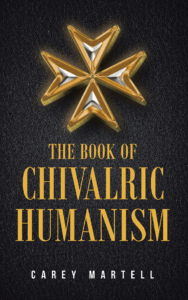 The Book of Chivalric Humanism is a collection of essays and observations that contains the core principles of Chivalric Humanism and is the foundation of its philosophy and dogma. This is a moral framework for atheists seeking useful practical advice for how to live a virtuous and purpose driven life.
The Book of Chivalric Humanism is a collection of essays and observations that contains the core principles of Chivalric Humanism and is the foundation of its philosophy and dogma. This is a moral framework for atheists seeking useful practical advice for how to live a virtuous and purpose driven life.
If you enjoy the books Good Without God by Greg Epstein, Humanism: A Very Short Introduction by Stephen Law, and The Good Book: A Secular Bible by A.C. Grayling, then you you’ll enjoy The Book of Chivalric Humanism.
Overview of The Book of Chivalric Humanism
Core Philosophy
Chivalric Humanism is presented as a virtue-based moral framework that synthesizes elements of chivalry and humanism to create a rational, ethical system for guiding human behavior. Unlike religious frameworks, it is grounded in naturalism, reason, and objective reality, rejecting supernatural beliefs as obstacles to wisdom and progress.
- Chivalry as Ethical Discipline: The book adapts the medieval code of chivalry to modern humanist principles. It sees a new generation of self-identified ‘knights’ not as warriors but as moral champions who uphold virtue and protect others.
- Humanism as Rational Morality: Humanism in this context is a secular philosophy that values human dignity, critical thinking, and the pursuit of knowledge.
- A Call to Virtue: The book argues that virtue should not be subjective or culturally relative but rooted in rational principles that promote human survival and flourishing.
Structure of the Book
The book is divided into four major sections, each expanding on key aspects of Chivalric Humanism.
Book One: Humanism
This section introduces why Chivalric Humanism is needed in modern civilization. It critiques hedonism, irrational belief systems, and ideological extremism, arguing that many contemporary moral systems fail to provide a stable and objective foundation for ethical behavior.
Key points:
- Human civilization lacks unity, which hinders progress.
- Atheism alone is not enough; secular societies need an ethical framework beyond just rejecting superstitious religions.
- The ultimate goal is human survival, both individually and as a species.
- Rights are human constructs, not innate or divinely granted, and must serve rational purposes.
Book Two: Ethics
This section outlines what it means to be good and defines a virtue-based moral code for followers of Chivalric Humanism.
Key ethical ideas:
- Four Positive Principles: The foundation of the moral framework; Truth, Love, Courage and Wisdom.
- Eight Noble Virtues: Similar to medieval chivalric values but adapted for modern secular life: Loyalty, Altruism, Valor, Respect, Hope, Humility, Integrity, and Duty.
- Moral failures: The book identifies four negative principles (Falsehood, Hatred, Cowardice and Ignorance) and eight faults (Treachery, Selfishness, Greed, Disrespect, Despair, Vanity, Dishonesty, and Recklessness) that lead to social decay and personal corruption.
- Justice and Consequences: Punishment should be rational, proportional, and focused on maintaining stability rather than revenge.
Book Three: Human Potential
Explores self-improvement, mindfulness, and discipline as key components of a meaningful life.
Key points:
- Developing talents is essential for self-worth and societal contribution.
- Martial arts, meditation, and discipline are recommended practices.
- Noblesse Oblige: The ethical duty of those with talent or power to use it responsibly.
Book Four: Science and Reason
This section emphasizes scientific thinking, rational inquiry, and logical analysis as the bedrock of an ethical life.
Key points:
- The Scientific Method: The best way to discover objective truth.
- The Danger of Pseudoscience: Many ideological and religious belief systems rely on false premises.
- Logical Reasoning: Encourages analytic thinking over emotional decision-making.
